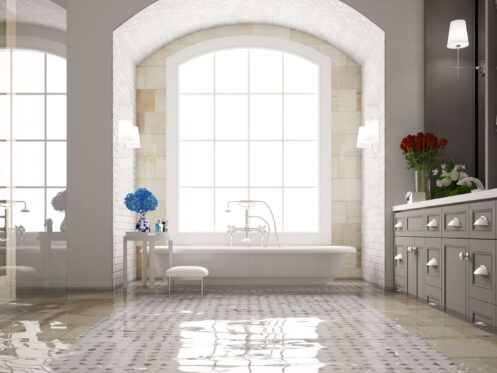Homeowners in Florida often need both flood and water damage insurance. This dual coverage offers complete protection against different kinds of water-related damage, which is necessary due to varying statewide climatic threats.
Understanding the Differences Between Flood and Water Damage Insurance
In most cases, flood insurance will pay for repairs when water from natural disasters, like hurricanes, river floods, or storm surges, enters a residence. The National Flood Insurance Program (NFIP) and commercial insurers usually handle this coverage, which is specific to natural flooding disasters. Water damage insurance is a common component of homeowner’s policies; it typically pays for repairs or damage caused by leaking pipes and other indoor water sources. In contrast to flood insurance, which deals with “rising water,” water damage insurance pays for unexpected, non-flood-related water problems. Homeowners in Florida can better safeguard themselves against water-related dangers by understanding this difference.
Hurricane Weather
Hurricane season in Florida is known for its harsh weather, which includes heavy rain, strong winds, and floods. Because storms often cause water levels to rise and overflow into houses, flood insurance is crucial in these situations. Water damage insurance would be of benefit during instances when wind-driven rain causes leaks via damaged roofs or windows. Claims for both flood and water damage may be necessary for homeowners in certain situations. For example, if hurricane winds tear off part of a roof, rainwater can pour into the home from above, while floodwaters may also enter at ground level.
Heavy Rainfall
Extreme downpours, which are a regular occurrence in Florida’s tropical environment, can cause fast flash flooding in some areas. In these cases, even with a sump pump installation, water builds up too quickly to be cleared out. When this “rising water” enters basements or lower levels, flood insurance kicks in to help pay for repairs. If rainfall seeps inside via porous surfaces like walls, windows, or roofs, water damage insurance would pay for the repairs.
Storm Surge Risks
Coastal locations are particularly vulnerable to the devastating effects of storm surges during hurricanes and other severe storms. If you own a property in a low-lying location and a surge brings large amounts of saltwater onto land, you should get flood insurance. Storm surges can cause unforeseen problems on the inside as well, such as seawater seeping into pipes or destroying construction materials. For the most part, flood insurance would pay for repairs after a flood. However, water damage insurance might come in handy for dealing with unexpected issues, such as pipe corrosion or mold.
Floodplain Areas
Floodplains are naturally prone to flooding, and many residences in Florida are situated in these locations. For this reason, flood insurance is a must-have; even a little rain can raise water levels. On the other hand, flood insurance doesn’t usually cover the continuous dangers that floodplain properties confront. These include hazards such as water seeping through foundations and problems with basement dampness. Because it addresses concerns unconnected to actual flooding, water damage insurance is vital for handling these internal problems.
Overflowing Canals and Rivers
When storms or severe rains strike Florida, its massive canal and river system sometimes overflows, flooding nearby houses. If rising water were to penetrate a property, flood insurance would pay for the repairs. Water damage insurance, however, is key to dealing with supplementary issues like foundation seepage or insulation weakened by extended exposure to water.
Mold Growth
Mold thrives in Florida’s warm and humid climate and is especially worrisome for homes that have water damage. Even small leaks and minor flooding can cause mold to grow, which is very dangerous to your health. Although flood insurance can pay for damage from water, it usually does not pay to remove mold, which can be a costly ordeal. If mold growth occurs as a consequence of an insured water event, such as a broken pipe, however, mold cleanup costs are usually covered by water damage insurance.
Sewer Backups
Sewer backups, caused by storms and strong rains, can inundate houses with polluted water. Although flood insurance often pays for water damage caused by natural floods, it typically does not cover backup from sewers. Sewer backup coverage is an optional component of many water damage insurance plans; it can be a lifesaver when it comes to paying for cleaning and repairs. For example, if heavy rains cause sewage to back up in your home, sewer backup coverage can cover the cost of cleaning carpets and disinfecting surfaces. You may also need to replace damaged materials, like flooring or drywall, which the insurance coverage can help pay for. This can lead to you saving thousands of dollars.
Saltwater Intrusion
The invasion of saltwater into freshwater resources can damage pipes and construction materials; this is known as saltwater intrusion. It is a common concern for properties situated along Florida’s coast. Flood insurance doesn’t usually cover damages caused by saltwater but many homeowner’s insurance policies with water damage coverage do.
Erosion-Related Flooding
The erosion of Florida’s rivers and coasts alters the land’s contours, making it easier for water to flow into houses. Damage from this kind of flooding is typically covered by flood insurance. However, erosion may also produce fundamental changes and structural difficulties that lead to water intrusion. If you want to fix these problems on the inside of the home, you need water damage insurance to pay for the repairs.
Swimming Pool Overflows
When swimming pools overflow due to storms or heavy rain, it may cause water damage to the surroundings around them. Although flood insurance may cover floods in general, it might not cover a backyard pool overflow specifically. You would need water damage insurance to pay for repairs caused by the pool overflowing into your home.
Speaking With a Specialist
It is crucial to consult an insurance expert in Florida to ascertain the optimal home coverage for your home. Understanding the distinctions between water damage coverage, flood insurance, and homeowners insurance is crucial for Floridians because of the specific hazards posed by storms, floods, and water damage. You can better protect your home against unexpected water leaks and floods with the help of a professional. This expert will evaluate your property’s risk factors and advise you on the best policies to purchase.
How Often Should You Update Insurance Policies
Be sure to check and update your homeowner’s, flood, water damage, and other insurance plans regularly. The consensus amongst experts is that you should do a review:
- Annually
- After any relocation
- After the acquisition of new assets
- After making any renovations to your home
Your insurance requirements could evolve while you live in Florida, a state prone to storms and floods. Furthermore, adjusting your insurance limits to reflect inflation and changes in local hazards is essential.
Bamboo Plumbing is a go-to provider of flood and water damage repairs. We specialize in emergency plumbing service, water line repairs, slab leak repairs, sump pump installations, and more. Bamboo Plumbing even provides tankless water heater services. Call us now to schedule water or flood damage repairs for your home in Hollywood, FL.

